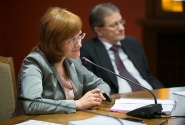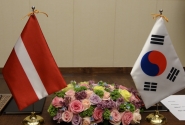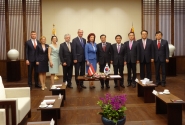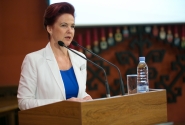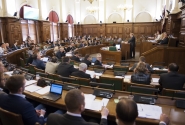On Monday, 10 June, during her meeting in the main building of the Saeima with Glauk Konjufca, Deputy Speaker of the Assembly of Kosovo, and his delegation consisting of staff members of the Assembly and representatives of NGOs, Inese Lībiņa-Egnere, Deputy Speaker of the Saeima, said that Latvia has accumulated valuable experience in promoting dialogue with society and cooperation with NGOs and is ready to share this experience with Kosovo, which aims to shape a high-quality dialogue with civil society.
Press releases
Speaker conveys condolences to the Georgian people (07.06.2013.)
On Friday, 7 June, Solvita Āboltiņa, Speaker of the Saeima, sent a letter to David Usupashvilli, Speaker of the Georgian parliament, conveying condolences regarding the death of seven Georgian soldiers in an explosion while serving in Afghanistan.
Zanda Kalniņa-Lukaševica: Positive Convergence Report imposes greater obligation on us to continue reforms (05.06.2013.)
The Convergence Report issued today by the European Commission confirms that Latvia meets the conditions for adopting the euro. This is a great opportunity for the future growth of Latvia’s economy, but at the same time it imposes a greater obligation on us to continue reforms that have been commenced. So said Chairperson Zanda Kalniņa-Lukaševica during today’s meeting of the European Affairs Committee.
Saeima deems smoking in the presence of a child as abuse (30.05.2013.)
Physical abuse is the intentional application of force to a child that threatens the health or life of the child or the intentional subjection of a child to a harmful environment, including tobacco smoke. This is set forth in the amendments to the Protection of the Rights of the Child Law, which the Saeima adopted in the third and final reading on Thursday, 30 May. This provision protects a child’s right to grow up in a smoke-free environment.
Āboltiņa calls on the South Korean Prime Minister to support Latvia’s accession to the OECD (23.05.2013.)
Latvia is ready to join the Organisation for Economic Cooperation and Development (OECD) and calls on the Republic of Korea to support our country’s accession to this organisation during the next round of enlargement, said Solvita Āboltiņa, Speaker of the Saeima, when meeting with Prime Minister Chung Hong-won during her official visit to the Republic of Korea.
“Latvia highly appreciates the fact that the Korean company Samsung Electronics has chosen Riga as its regional centre for operations and has thus recognised the advantages our country offers. The company’s products are popular in Latvia; therefore, I invite Samsung Electronics to expand its operations in Latvia,” emphasised Solvita Āboltiņa, Speaker of the Saeima, when meeting with representatives of Samsung Electronics on Wednesday, 22 May, during her official visit to the Republic of Korea.
Solvita Āboltiņa: Latvia and the Republic of Korea have great potential for economic and political cooperation (22.05.2013.)
On Wednesday, 22 May, during her meeting in Seoul with Kang Chang-hee, Speaker of the National Assembly of the Republic of Korea, Solvita Āboltiņa, Speaker of the Saeima, emphasised that Latvia and the Republic of Korea have great potential for economic and political cooperation. Concurrently, Speaker Āboltiņa welcomed the rapidly developing bilateral relations including the 30% increase in trade turnover during 2012, as well as the opening of the embassy of the Republic of Korea in Riga.
On Monday, 20 May, during the opening of the annual Saeima and NGO forum on Stability, Partnership, Development, Solvita Āboltiņa, Speaker of the Saeima, stressed that it is important for non-governmental organisations to give candid feedback to parliamentarians regarding their work in order to continue collaboration and to pursue common goals, as well as to involve every member of society in the development of our country because non-governmental organisations are a nation’s forum which operates daily.
More than 4,000 visit Saeima during the Night of Museums (18.05.2013.)
On Saturday, 18 May, during the five-hour-long Night of Museums more than 4,000 people visited the main building of the Saeima, where they could see the interior of the building and the Plenary Chamber, as well as several exhibitions. The exposition A Green Parliament: The Life of Paper gave an insight into how the use of paper in the parliament has changed over time and how paper is recycled – the process that transforms office waste paper to brand new products. The exposition has been created in cooperation with the Līgatne paper mill.
Saeima in the second reading supports the ban on using USSR symbolism also during festive events (17.05.2013.)
On Thursday, 16 May, the Saeima considered in the second reading the Draft Law on the Amendments to the Law on Safety during Public Entertainment and Festive Events and supported the proposal to ban the use of USSR and Nazi symbols, including stylised ones, also during public entertainment and festive events. Currently the ban applies only to participants of rallies, marches and pickets.







